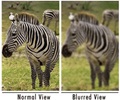There is no difference in efficacy between Bevacizumab (Avastin) and Ranibizumab (Lucentis) for the treatment of age-related macular degeneration (AMD), investigators from Boston University School of Medicine (BUSM) and the VA Boston Healthcare System have shown.
The study, which appears currently on-line in the American Journal of Ophthalmology, is the first to report early outcomes of a prospective, double-masked, randomized, controlled trial comparing Bevacizumab to Ranibizumab for the treatment of exudative (wet) age-related macular degeneration.AMD is the leading cause of blindness over the age of 50 in developed Western countries. It can present in 2 forms, exudative (wet) or nonexudative (dry). While dry AMD can lead to severe vision loss, wet AMD is often more visually devastating with a higher risk of blindness. The gold standard of treatment is ranibizumab (Lucentis, Genentech Inc.), which was FDA approved for AMD in 2006. Bevacizumab (Avastin, Genentech Inc.) was FDA approved for colo-rectal cancer in 2004, and has since been used worldwide as an off-label, local intravitreal treatment for wet AMD. Both have shown to be efficacious in the treatment of AMD, however, it is unknown which one is more effective.
This study was supported with resources and the use of facilities at the Veterans Affairs Boston Healthcare System, Jamaica Plain, MA. The VA funded the cost of medications for this study. Patients were enrolled by a 2:1 randomization to either the bevacizumab (2) or ranibizumab (1) arm of the study. Once inclusion criteria were met, patients were given intravitreal injection of bevacizumab or ranibizumab every month for the first three months (as they began the trial, month one, and month two). Following the third injection, patients returned for monthly examination and testing and received further injections on an as needed basis for one year.
"Our study aimed to offer early, six-month results of a randomized, double-masked, single center clinical trial comparing the off-label use of bevacizumab with the current gold standard ranibizumab. With a total of 20 subjects and a 2:1 randomization, early results of this trial suggest that at 6 months, visual outcomes of bevacizumab appear to be no different from ranibizumab," said lead author and Principal Investigator Manju Subramanian, MD, an assistant professor in Ophthalmology at BUSM.
Genentech Pharmaceuticals (the manufacturer of both drugs) has refused to sponsor a head to head trial comparing the 2 treatments. The open market cost of a single injection of Ranibizumab (Lucentis) is approximately $2000.00. Comparatively, the cost of a single injection of Bevacizumab (Avastin) for AMD is $40.00. Patients potentially undergo up to 13 injections per year, leading to a large cost differentiation for treatment of this common eye disease. The National Eye Institute is sponsoring the Comparison of AMD Treatment Trials Study (CATT Study), a multi-centered, randomized, double-masked, clinical trial designed to assess the efficacy of bevacizumab compared to ranibizumab therapy and will be conducted in 44 clinical centers throughout the United States. Early results are expected in 2011.
Advertisement
RAS















